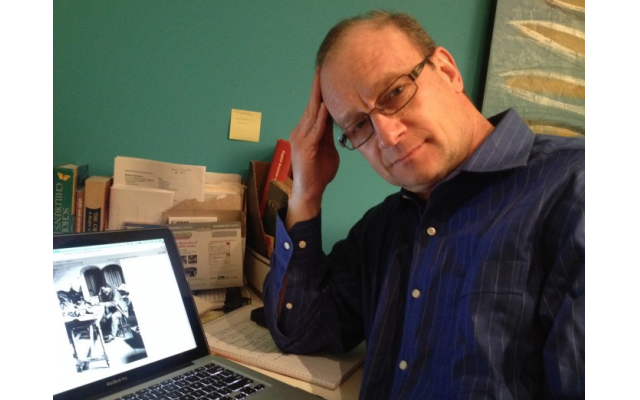A Silver Lining in COVID-19’s Dark Cloud
Dave Schechter discusses spending Jewish holidays in quarantine.
Dave Schechter is a veteran journalist whose career includes writing and producing reports from Israel and elsewhere in the Middle East.
Maybe the most fun I’ve had since being told to remain on the premises was a Shabbat candle lighting via Zoom with my wife’s family.
In some senses, it was like any time this bunch gets together: aunts and uncles catching up with their nieces and nephews, and cousins with each other, humor specific to the family, and, when you took a moment to think about it, recognition that this occasion was special.
Albeit minus the food.
My father-in-law could see his three daughters and his son, along with 11 grandchildren (and a bearded lizard and a few dogs), who besides Atlanta live in Dripping Springs, Texas; Coral Gables, Fla.; Columbia, S.C.; Chicago, and West Bloomfield, Mich. The only person missing was my mother-in-law, in a memory care facility, who will be shown pictures of the screen, which had more boxes than “The Brady Bunch” or “The Hollywood Squares.”
As my wife asked, why didn’t we do this before now?
If the coronavirus is a dark, ominous, threatening storm cloud over all our heads, the way that families have employed social media and video conferencing platforms might be a silver lining.
I call my 92-year-old mother in Chicago most every day, but the occasional chat via video technology, along with whichever of my siblings is available, has been a good tonic for her, as she has been confined to her senior residence apartment as a health precaution.
One day I gave my mother and youngest sister a guided tour of our backyard, highlighted by the vegetable garden box and the fruit vines, and a blooming azalea.
The tomatoes, basil and eggplant, started from flats, are several inches tall. The corn may never reach as high as an elephant’s eye, but small green shoots have emerged from beneath the soil. Whether sunflowers bloom from the seeds planted along the back of the driveway remains to be seen. The vines planted by a novice horticulturist years ago – blueberries, raspberries, and blackberries – appear healthy, but there will be nothing to pick for a couple of months.
The garden store has barred customers from going inside, so my order for plants, seeds and potting soil was brought outside. My last “recreational” was my weekly lunch with a friend, during which we sat at a broad table and ate carry-out from a neighborhood eatery.
Since then, my only ventures off-site have been to the doctor’s office on three successive Mondays to continue cancer maintenance treatments. I am grateful that these have not been postponed as the medical infrastructure in Atlanta and elsewhere continues to be tested by an appalling lack of necessary materials and equipment to treat the COVID-19 coronavirus, which continues to shine a bright light on a nation ill-prepared for a large-scale public health crisis.
Since March 11, I have written about a dozen pieces reporting how Atlanta’s Jewish community has adapted to the new reality forced by a disease that has closed synagogues, schools and other institutions; sparked creative solutions for prayer, for teaching, and for meeting, and already is taxing the financial resilience of the local Jewish “ecosystem.”
There have deaths and illnesses in the community linked to COVID-19. We worry about our extended families amid wrenching stories from friends about relatives ill or dying alone in cities far from Atlanta, without family present, as a health precaution. To all who mourn we say, may their memories be a blessing.
Passover this year will be tinged by absences from our seder tables, particularly by those whose age made staying in place the medically prudent course of action. “Next year not in quarantine” is a refrain I heard more than once.
As much as social media platforms and video conference technology help bridge the physical distance, they cannot fulfill emotional longings to be present in-person.
During that Zoom gathering with my father-in-law, my wife’s siblings, as well as our children and their cousins, we did finally get around to lighting Shabbat candles, as well as the prayers over the wine and bread. That may have been the stated purpose of the gathering, but the real blessing was having everyone together, at least in this virtual room.




comments